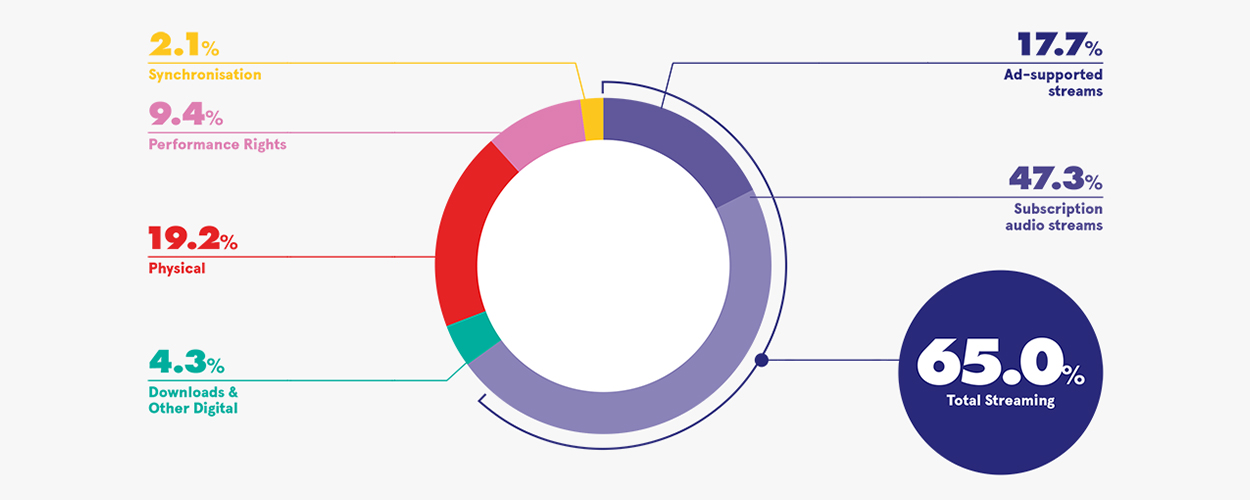This website uses cookies so that we can provide you with the best user experience possible. Cookie information is stored in your browser and performs functions such as recognising you when you return to our website and helping our team to understand which sections of the website you find most interesting and useful.
Business News CMU Digest
CMU Digest 27.03.22: IFPI, Spotify, UK budget, Google, FLVTO/2conv
By Chris Cooke | Published on Sunday 27 March 2022

The key stories from the last week in the music business…
The International Federation Of The Phonographic Industry confirmed that the global recorded music market grew by 18.5% in 2021 to $25.9 billion. Premium streaming powered the boom, with revenues from paid-for streaming services up 21.9% to $12.3 billion. Though most other revenue streams also increased last year, including free streaming, sync, broadcast and public performance, plus physical product, with both vinyl and CD sales up. Some of those other revenues were negatively impacted by the pandemic in 2020, meaning the increases were in part a bounce back after a COVID-caused dip. However, physical product revenues were up 16.1% to $5 billion, which is higher than CD and vinyl sales generated in both 2018 and 2019. In terms of what accounts for what percentage of the market, it goes premium streaming (47.3%), physical (19.2%), free streaming (17.7%), broadcast and public performance (9.4%), downloads (4.3%) and sync (2.1%). [READ MORE]
Spotify published a bunch of new stats including that it paid $7 billion into the music industry in 2021. The stats appear on the streaming firm’s Loud & Clear website, which partly seeks to explain how the streaming music business works, but also to counter criticism of Spotify from parts of the music community. That $7 billion – of which more than $1 billion went to music publishers and songwriters – was not only the highest annual payment from any one individual digital or retail business partner in 2021, Spotify was keen to stress, it was also the highest annual payment from any one individual digital or retail business partner in the history of the music rights industry. Also seeking to counter the narrative that Spotify only helps major record companies and superstar artists, the digital firm insisted that more artists are making money in the streaming age, with more than 50,000 music-makers seeing their music generate more than $10,000 in Spotify royalties last year. The Spotify stats are definitely interesting, though it’s debatable whether they really placate the company’s critics. [READ MORE]
The music industry was generally critical of the spring budget statement made by UK Chancellor Of The Exchequer Rishi Sunak. Although he confirmed that a 50% discount on business rates that benefits grass roots music venues will stay in place, most of the other support measures sought by the live music sector were ignored. In particular, venues and promoters wanted the VAT discount on ticket sales that was introduced during the pandemic to be extended beyond the end of this month to help a sector still very much in revival mode after two years of COVID caused disruption, but such an extension was not announced. Industry reps say that the increase of VAT on ticketing from 12.5% back to 20% will cause significant hardships for a sector already facing rapidly rising costs and with audiences unlikely to be able to afford a surge in ticket prices. [READ MORE]
Google announced a partnership with Spotify that will allow the streaming firm to integrate its own payments platform into its app on Android devices. App makers like Spotify have long criticised the rule that says in-app payments can only be made via Apple and Google’s commission charging transaction systems. Given the commissions charged are initially 30% – which is more or less Spotify’s profit margin – that means a service like Spotify either has to pass that commission onto the customer or just not take in-app payments. Spotify, and others, like Fortnite maker Epic Games, have been seeking to force a change to those rules. Google announced a pilot to allow alternative payment options to appear in apps on Android devices, albeit providing its own payments platform is also offered as an option. Spotify is the first company to participate in that pilot. [READ MORE]
The operator of stream-ripping sites FLVTO and 2Conv confirmed he is appealing the $83 million in damages he was ordered to pay the record companies. The labels sued Tofig Kurbanov in the US on the basis his stream-ripping sites are liable for copyright infringement. Although he initially sought to fight that litigation in court, Russia-based Kurbanov ultimately bailed on the case, meaning the labels won by default, subsequently being awarded the $83 million in damages. Kurbanov argues that, even though he bailed on the case and the labels won by default, said labels should still have had to actually prove in court that their recordings were ripped via FLVTO and 2Conv within the US in order to claim the damages, which they did not. His lawyer said his client is appealing the damages “to shed light on a legal process that has gone off the rails”, claiming that the precedent set in this case means “no one who operates a website is safe”. [READ MORE]





